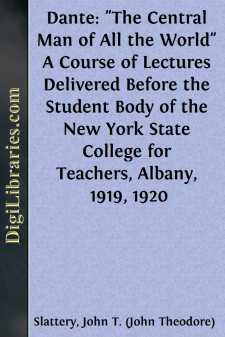Categories
- Antiques & Collectibles 13
- Architecture 36
- Art 48
- Bibles 22
- Biography & Autobiography 813
- Body, Mind & Spirit 142
- Business & Economics 28
- Children's Books 16
- Children's Fiction 13
- Computers 4
- Cooking 94
- Crafts & Hobbies 4
- Drama 346
- Education 46
- Family & Relationships 57
- Fiction 11829
- Games 19
- Gardening 17
- Health & Fitness 34
- History 1377
- House & Home 1
- Humor 147
- Juvenile Fiction 1873
- Juvenile Nonfiction 202
- Language Arts & Disciplines 88
- Law 16
- Literary Collections 686
- Literary Criticism 179
- Mathematics 13
- Medical 41
- Music 40
- Nature 179
- Non-Classifiable 1768
- Performing Arts 7
- Periodicals 1453
- Philosophy 64
- Photography 2
- Poetry 896
- Political Science 203
- Psychology 42
- Reference 154
- Religion 513
- Science 126
- Self-Help 84
- Social Science 81
- Sports & Recreation 34
- Study Aids 3
- Technology & Engineering 59
- Transportation 23
- Travel 463
- True Crime 29
Dante: "The Central Man of All the World" A Course of Lectures Delivered Before the Student Body of the New York State College for Teachers, Albany, 1919, 1920
Categories:
Description:
Excerpt
DANTE AND HIS TIME
To know Dante we must know the age which produced Christianity's greatest poet, he whom Ruskin calls "the central man of all the world, as representing in perfect balance the imaginative, moral and intellectual faculties, all at their highest." Other writers are not so dependent upon their times for our clear understanding of their books. Dante to be intelligible to the modern mind, cannot be taken out of the thirteenth century. "Its contemporary history and its contemporary spirit" says Brother Azarias in his Phases of Thought and Criticism, "constitute his clearest and best commentary." Only in the light of this commentary can we hope to know his message and realize its supremacy. And that it is worth while to make the study there can be no doubt upon the part of any seeker of truth and admirer of beauty.
Emerson said: "I think if I were a professor of rhetoric I should use Dante for my text-book. Dante is the rhetorician. He is all wings, pure imagination and he writes like Euclid." James Russell Lowell told his students in answer to the question as to the best course of reading to be followed: "If I may be allowed a personal illustration, it was my own profound admiration for the Divina Commedia of Dante that lured me into what little learning I possess." Gladstone declared: "In the school of Dante I learned a great part of that mental provision ... which has served me to make the journey of human life." It surely must be of inestimable advantage to sit under the instruction of one of the race's master teachers who stimulates one to lofty thinking and deep feeling, leads one into realms of wider knowledge and helps one to know his own age by revealing a mighty past.
To see that mighty past, to live again with Dante in the thirteenth century is possible only after we have cleared the way with which ignorance and misrepresentation have encumbered the approach. Here, perhaps, more than in any other period of civilization is the dictum true that history is often a conspiracy against the truth. We moderns who are not only obsessed with the theory of evolution, but are dominated by the idea that nothing of permanent value can come from medievalism, arrogantly proclaim that ours is the greatest of centuries because we have not only what all other centuries had, but something else distinctively our own—a vast contribution to the world's progress. This self-complacency makes us forget that whatever truth there may be in the great theory of evolution, certainly the validity of the theory is not confirmed by the intellectual history of the human race. As was said of the Patriarchal Age so we may say of Dante's times "there were giants in those days" which we presume to ignore. Homer, Shakespeare, Dante, indeed stand forth in irrefutable protest against the questionable assertion of evolution that the present is intellectually superior to the past.
The evolutionary theory prejudices our age against acknowledging the high accomplishments of the past. So to know the truth we must overcome the conspiracy with which so-called history has enveloped the past, especially those generations immediately prior to Dante's....


